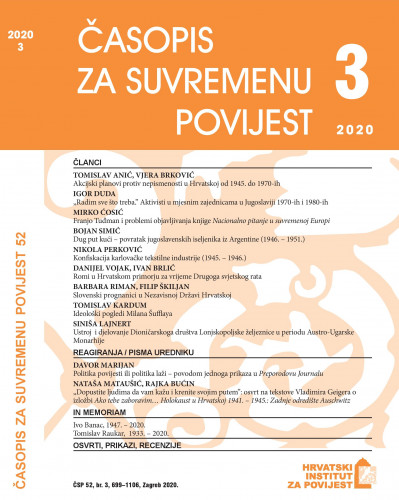Rad nastoji uklopiti ideološke poglede Milana Šufflaya u širi europski kontekst antimodernističkih i antiprosvjetiteljskih tendencija. S time je povezan i Šufflayev pogled na hrvatsku naciju i hrvatski nacionalni identitet. U radu se razmatraju i Šufflayeva geopolitička promišljanja. Šufflay je kritičar modernoga svijeta i njegovih manifestacija, zastupnik je organskoga nacionalizma, a hrvatski nacionalni identitet konstruira nasuprot jugoslavenskom, ističući važnost povijesnoga pamćenja, kulture, geografije i rase pri oblikovanju nacije, a marginalizirajući značenje jezika. Isticat će katoličku vjersku pripadnost Hrvata i pripadnost zapadnoj civilizaciji kao temeljne značajke hrvatskoga nacionalnog identiteta.; The paper attempts to explain Milan Šufflay’s ideological views in a broader European context of anti-modernism and counter-Enlightenment tendencies. Milan Šufflay was a critic of the modern world and its manifestations. His views were similar to other counter-Enlightenment thinkers such as Oswald Spengler, Henri Bergson, Gustave Le Bon, etc. Šufflay despised individualism and rationalism, and admired collectivism and power of the myth. Šufflay thought that the answer to problems of the modern world lay in a return to medieval values – i.e. spiritual values against material values, which were predominant in his time. Šufflay’s anti-modernist views were closely connected with his nationalism. He was a proponent of organic nationalism and claimed that a nation is a community of the present, former, and future generations. In his works, he stressed the importance of historical memory, culture, geography, and race as factors in the shaping of the nation. He emphasised the Catholic faith of Croats and Occidentalism, which he claimed manifested through the whole of the nation’s history and should therefore be represented in the collective memory of Croats. In that sense, Šufflay’s views were similar to those of Croatian interwar nationalists (e.g. Filip Lukas), and he also constructed Croat national identity vis-a-vis Yugoslavism. Because of the great differences between Croats and Serbs, Šufflay claimed that Yugoslavia was an artificial and unsustainable state. Šufflay’s geopolitical insights were also connected with his essentialist vision of the two perennial antagonistic camps – East and West. In that sense, he anticipated Samuel Huntington’s idea about the Clash of Civilizations.
Sažetak

 Časopis za suvremenu povijest : 52,3(2020) / glavni i odgovorni urednik, editor-in-chief Zdravka Jelaska Marijan.
Časopis za suvremenu povijest : 52,3(2020) / glavni i odgovorni urednik, editor-in-chief Zdravka Jelaska Marijan.